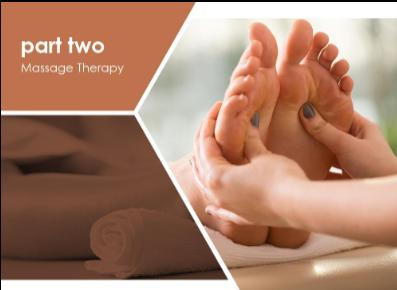Medical Pain Management: What You Need to Know – PART 2: Massage Therapy

- posted: Aug. 05, 2020
Massage therapy is one of the oldest methods of healing—some medical texts nearly 4,000 years old contain references to this technique. In fact, Hippocrates, known as the “Father of Western Medicine,” talked about massage in a text he wrote in the 4th century B.C.: “The physician must be acquainted with many things, and assuredly with rubbing.” Today, aside from rubbing, massage therapy involves hands-on manipulation of the body’s soft tissues, such as the muscles, tendons, ligaments and joints, to further optimize a person’s health.
What You Can Expect From Massage Therapy
Since it acts on the muscular, circulatory and nervous systems, this type of pain control treatment offers a therapeutic effect on the body and overall well-being. Massage therapy uses a wide range of techniques, such as manual therapy and rehabilitative exercises, including stretching and strengthening. Patients undergoing massage therapy can develop, maintain, and improve their physical function. In return, physical stress and dysfunction can be relieved or prevented.
Registered Massage Therapists (RMT) are devoted to restoring and preserving your optimal health. They use various specialized hand movements over the skin and clothes. Your designated massage therapist will work with your level of pain tolerance during the session, and the treatment can be halted at any time should it become uncomfortable for you.
Signs You May Benefit From Massage Therapy
Many health conditions can be relieved through massage therapy because the manipulation of muscles and tissues affect so many different systems in the body. If you’re experiencing some or most of the following problems, you will most likely benefit from massage therapy:
- Frequent headaches
- Insomnia or poor sleep
- Pain in the neck, back, shoulder, hip, leg, knee or foot
- Lack of range of motion
- Stress, depression or anxiety
These warning signs indicate that your body is under stress and that it needs help. By undergoing massage therapy, you can enjoy better functionality, more relaxed sleep, and less stress. Massage therapy is a drug-free approach that complements other types of techniques like chiropractic, personal training and physiotherapy.

- posted: Aug. 05, 2020
Massage therapy is one of the oldest methods of healing—some medical texts nearly 4,000 years old contain references to this technique. In fact, Hippocrates, known as the “Father of Western Medicine,” talked about massage in a text he wrote in the 4th century B.C.: “The physician must be acquainted with many things, and assuredly with rubbing.” Today, aside from rubbing, massage therapy involves hands-on manipulation of the body’s soft tissues, such as the muscles, tendons, ligaments and joints, to further optimize a person’s health.
What You Can Expect From Massage Therapy
Since it acts on the muscular, circulatory and nervous systems, this type of pain control treatment offers a therapeutic effect on the body and overall well-being. Massage therapy uses a wide range of techniques, such as manual therapy and rehabilitative exercises, including stretching and strengthening. Patients undergoing massage therapy can develop, maintain, and improve their physical function. In return, physical stress and dysfunction can be relieved or prevented.
Registered Massage Therapists (RMT) are devoted to restoring and preserving your optimal health. They use various specialized hand movements over the skin and clothes. Your designated massage therapist will work with your level of pain tolerance during the session, and the treatment can be halted at any time should it become uncomfortable for you.
Signs You May Benefit From Massage Therapy
Many health conditions can be relieved through massage therapy because the manipulation of muscles and tissues affect so many different systems in the body. If you’re experiencing some or most of the following problems, you will most likely benefit from massage therapy:
- Frequent headaches
- Insomnia or poor sleep
- Pain in the neck, back, shoulder, hip, leg, knee or foot
- Lack of range of motion
- Stress, depression or anxiety
These warning signs indicate that your body is under stress and that it needs help. By undergoing massage therapy, you can enjoy better functionality, more relaxed sleep, and less stress. Massage therapy is a drug-free approach that complements other types of techniques like chiropractic, personal training and physiotherapy.
Our Hours
Primary Office
Monday
8:00 am - 6:00 pm
Tuesday
2:00 pm - 6:00 pm
Wednesday
8:00 am - 6:00 pm
Thursday
2:00 pm - 6:00 pm
Friday
8:00 am - 12:00 pm
Saturday
Closed
Sunday
Closed

